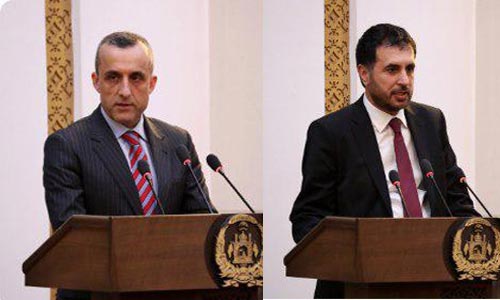Appointments of Mr. Assadullah Khalid as Minister of Defense and Mr. Amrullah Saleh as Minister of Interior are welcome signs in the process of the efforts undertaken by Afghan Government to improve efficiency and performance of defense and security institutions. Both these men had been part of previous Government headed by President Hamid Karzai, and both were Chief of Afghan Intelligence Agency the NDS in their turn. In addition, these figures are known for their anti-Pakistan and anti-Taliban stance. Their hands-on experience in Afghan government system and their knowledge, familiarity and access to sensitive information and operations during their tenure with the Government give them an edge over previous incumbents who had held these portfolios. Since last four years the National Unity Government has badly failed to put in place national agenda with a viable war strategy and plans to give definitive directions to defense and security institutions in the ongoing war against insurgent Taliban and their outside supporters i.e Pakistan and terrorist organizations dwelling in that country. This pathetic situation prevailed and as a result Taliban insurgents expanded their grip over Afghan territory from seventeen percent during the reign of the then Afghan President Hamid Karzai to more than forty percent during last four years. As a result, Taliban insurgents have gained greater diplomatic recognition with the help of their protectorate i.e. Pakistan and by virtue of their sweeping run over a large swath of Afghan territory in the country, which in turn has given them more leverage in the process of ongoing peace negotiations! This domino effect has taken immense toll on the people and Government in term of human lives – including military and police personnel and civilians – and resources, let alone lasting stain on credibility and ability of government to respond to present challenges facing the country and the Government of Afghanistan. It is believed that these appointments can turn things around in the defense and security organizations of the country, which can have direct and positive impacts in the battlefields with Taliban insurgents and other international terrorist groups operating in the country. Leadership always matters whatever the nature and task of the organization be.
Afghan defense and security institutions bear the most important responsibilities of defending citizens, country and face the challenge of defeating / containing an entrenched insurgency for last seventeen years now. Afghanistan has been unfortunate enough to have come under persistent interference and attacks by her hostile neighbor right after toppling of Taliban regime US and NATO forces and establishment of an interim Government in Kabul. It is inherent that establishing post-war working government and building national institutions in a country that has been in war since last four decades, is a difficult job. Compounding this problem was the urge to rebuild defense and security institutions at a time when there was nothing – utterly nothing – remaining of these organizations after toppling of Taliban regime. A hotchpotch of armed groups, who had sided with US and NATO militaries in the war against Taliban regime, were the only available option to fill the void and recruit them in the Ministry of Defense, Ministry of Interior and in the ranks of National Directorate of Security (NDS). Mujahedeen, as these armed groups were called, belonged to more than fourteen different organizations, which were founded / established in Pakistan and Iran aimed for the destruction of the then Afghan Government and its institutions back during the invasion of ex-USSR of Afghanistan in 1980s. The decades of 1980s and 1990s have proved fateful for Afghanistan as two streams of campaigns were underway for destabilizing the state of Afghanistan: the one harbored by US and Western block was aimed for defeat of the ex-USSR and the expulsion of the then red army from Afghanistan, which had been part of global anti-ex-USSR campaign; and the second steam – which was underground and pursued secretly – was unleashed by the Governments of Pakistan and Iran to pursue their vested interests and settlement of old scores with the Afghan states (including Durand line demarcation, water share and Shia support) under the cover of campaign to defeat and expel red army in Afghanistan. The later stream was not given due diligence and attention by major players in this entire campaign at the cost of people and the country of Afghanistan. Things had not shaped well after ex-USSR departed from Afghanistan as armed members of these organizations started to fight one another, turning the whole country into a fighting field. Fearing loss of control over Afghanistan, Pakistan founded and supported another armed group called Taliban and unleashed military campaign against the previously supported group, Mujahedeen, to establish control over the country. Then came the 9/11 incident, which dragged the foot of US and NATO member countries in Afghanistan.
Major tasks before these two newly appointed officials is to thoroughly overhaul both Ministries in Kabul and in all thirty-four provinces to remedy deviations, check background and record of all senior officials, surf through the logistics and support mechanisms and services for soldiers in battle fields and establish a strong command, control and response mechanisms throughout the chain of command of both ministries. In addition, cooperation and coordination among all security and defense institutions should be put in place and all parallel organizations and / or departments performing the same tasks under respective Ministries should be abolished in as soon as they are identified. Most importantly, people’s trust and delivery of good governance should equally be given due attention to remove existing distance between people and the Government.
Home » Opinion » Recent Reshuffle in the Leadership of Defense & Security Institutions, though belated, is Welcome
Recent Reshuffle in the Leadership of Defense & Security Institutions, though belated, is Welcome
| Mohammed Gul Sahibbzada

